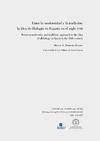Please use this identifier to cite or link to this item:
https://accedacris.ulpgc.es/jspui/handle/10553/77280
| Title: | Entre la modernidad y la tradición: la idea de filología en España en el siglo XVIII | Other Titles: | Between modernity and tradition: approach to the idea of philology in Spain in the 18th century | Authors: | Perdomo Batista, Miguel Angel | UNESCO Clasification: | 550510 Filología 55 Historia |
Keywords: | Filología Historia España Siglo XVIII Juan Andrés, et al |
Issue Date: | 2020 | Project: | ESCENARIO GALDÓS. Textos, pensamiento y escenarios de Benito Pérez Galdós. | Journal: | Cuadernos de estudios del siglo XVIII | Abstract: | Una aproximación a la idea de filología en España en el siglo xviii revelará que, durante la centuria, no hubo una, sino varias filologías: la filología humanista de tradición clásica, la historia erudita (o erudición histórica) de filiación barroca, la erudición crítica de los novatores, la de influjo racionalista y la de influjo empirista, que alcanzó su cima en la obra de Juan Andrés. Nos proponemos mostrar cómo las nuevas tendencias conviven y se entremezclan con otra no menos importante: la tradición. Y en este sentido, es preciso señalar que durante esta centuria se produce el deslinde definitivo entre Historia y Filología, y que esta última se repliega sobre sí misma a partir de la consolidación de la Historia Literaria y la Historia Literaria Comparada. Finalmente, reflexionaremos sobre el estatuto de la Filología en relación con el propio movimiento ilustrado, es decir, respecto a su contribución u oposición a las nuevas ideas. An approach to the idea of philology in Spain in the 18th century will reveal that, during the century, there was not one, but several philologies: the humanist philology of classical tradition, the erudite history (or historical erudition) of baroque affiliation, the critical erudition of the novatores, that of rationalist influence and that of empiricist influence, which reached its peak in the work of Juan Andrés. We propose to show how the new tendencies coexist and intermingle with another no less important one: tradition. And in this sense, it is necessary to point out that during this century there is the definitive demarcation between History and Philology, and that the latter withdraws into itself from the consolidation of Literary History and Comparative Literary History. Finally, we will reflect on the status of Philology in relation to the Enlightenment movement itself, that is, in relation to its contribution or opposition to new ideas. |
ISSN: | 1131-9879 | DOI: | 10.17811/cesxviii.30.2020.469-483 | Source: | Cuadernos de Estudios del Siglo XVIII [ISSN 1131-9879], n. 30, p. 469-483 |
| Appears in Collections: | Artículos |
Page view(s)
125
checked on May 11, 2024
Download(s)
154
checked on May 11, 2024
Google ScholarTM
Check
Altmetric
Share
Export metadata
Items in accedaCRIS are protected by copyright, with all rights reserved, unless otherwise indicated.
